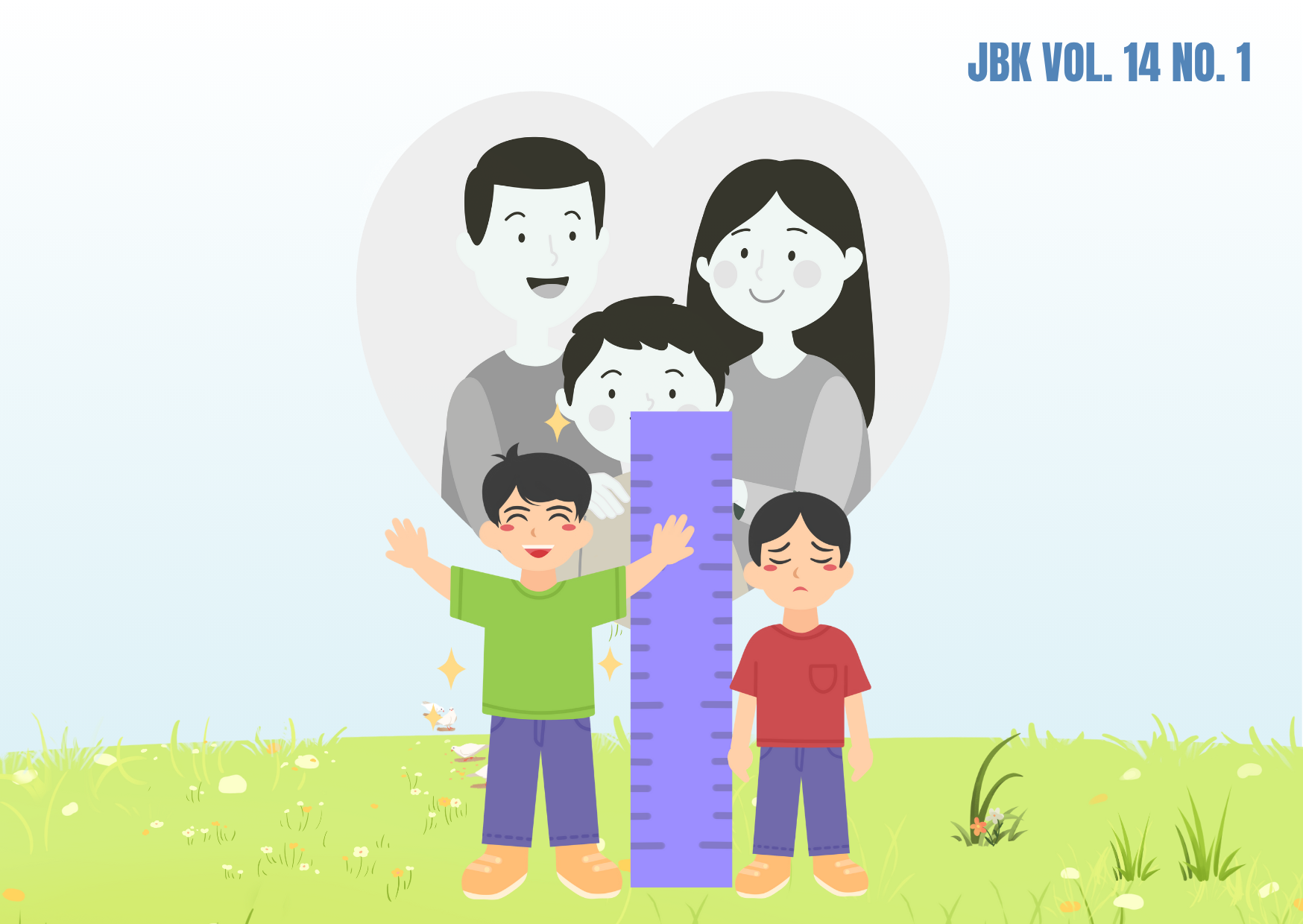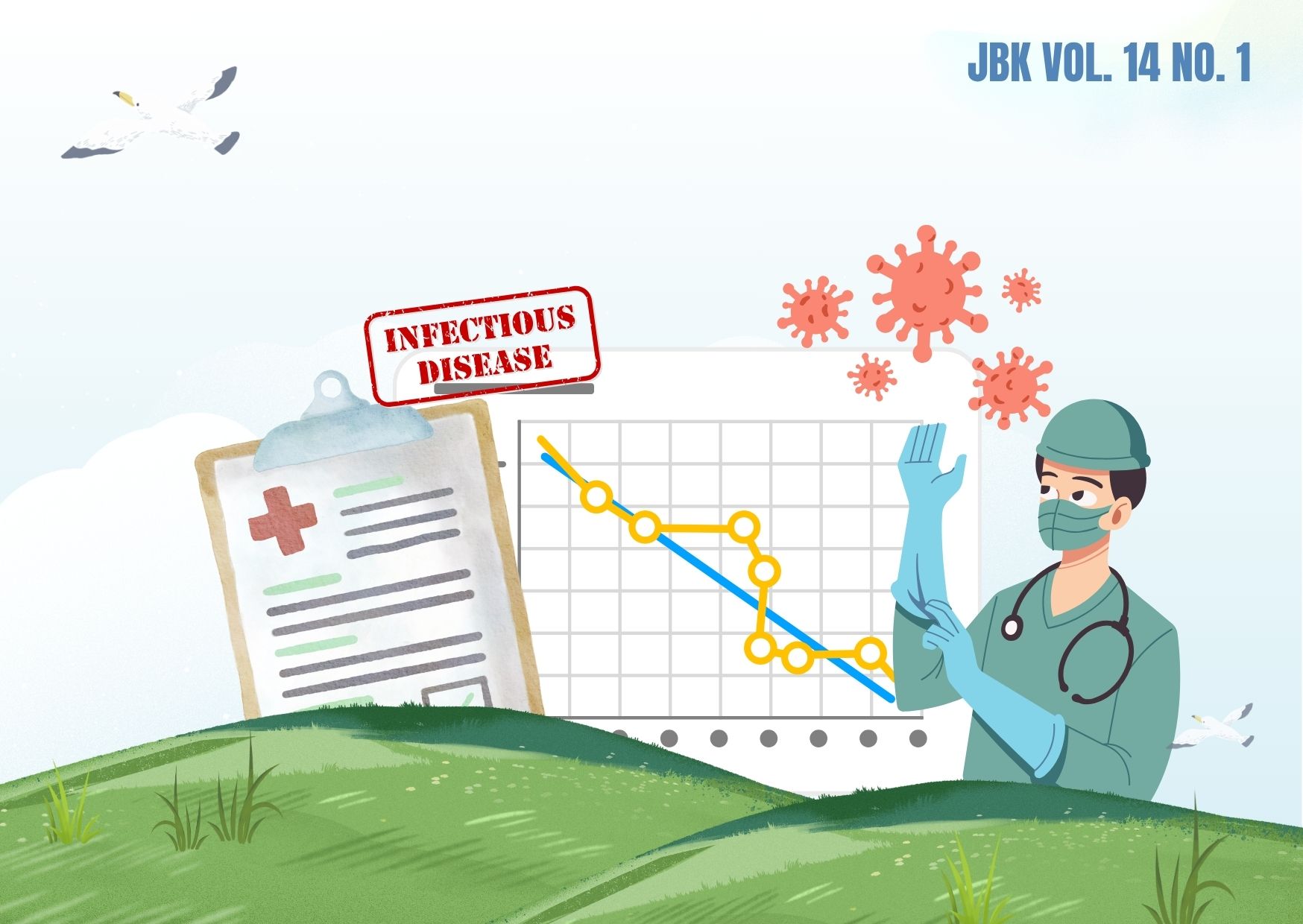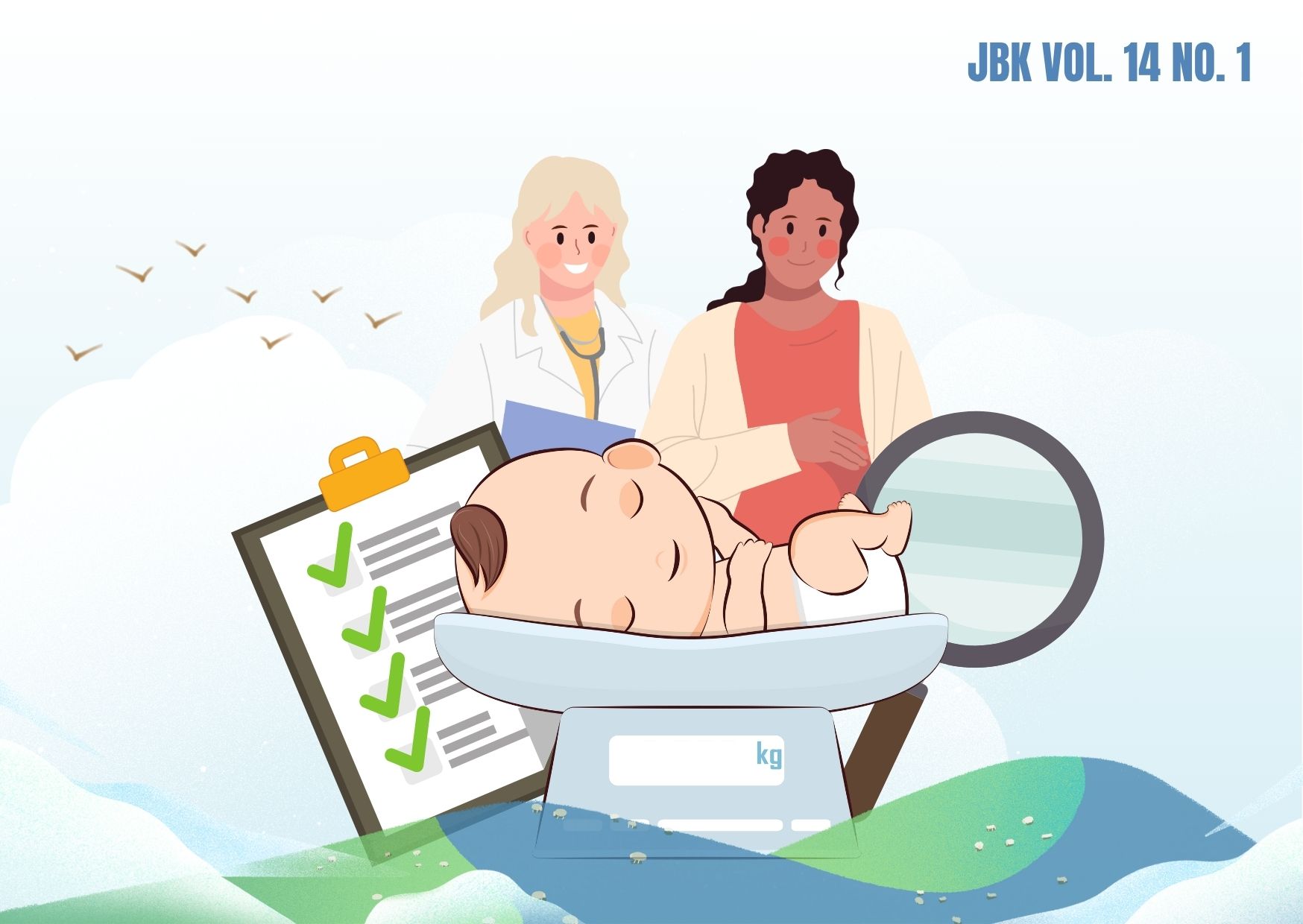DETERMINANTS OF FERTILITY PREFERENCE AMONG WOMEN AGED 15-49 YEARS IN CENTRAL JAVA PROVINCE (2022 FAMILY LIFE SURVEY ANALYSIS)
Uncontrolled population growth is a significant challenge for societies and governments, particularly in the healthcare sector. Indonesia as the world's fourth most populous country, faces this issue with a Total Fertility Rate (TFR) of 2.45, falling short of the intended target of 2.1 for achieving balanced population growth. Furthermore, Central Java Province, one of the most populous regions, records a TFR of 2.27, which is also below the target. It's crucial to note that even a slight decrease in TFR in a populous province can have a significant impact on the national TFR. This research investigates the determinants of fertility preference among women aged 15-49 in Central Java Province, using 2022 Family Life Survey data from the National Population and Family Planning Board 2022. The results of bivariate analysis using the Chi-square test (α=5%) indicate that fertility desires had a significant association with age at first marriage, education, occupation, and health insurance participation, but not related to contraceptive use. Multiple logistic regression (α=5%) reveals that women of reproductive age who married at 21 or older (AOR=0.791; 95% CI:0.786; 0.796) and employed women (AOR=0.798; 95% CI:0.793;0.803) were less likely to desire more than two children. On the other hand, women with health insurance subscriptions were more likely to desire more than two children (AOR=1.129; 95% CI:1.121;1.137). These findings emphasize that promoting women's education and employment, enhancing adolescent reproductive health programs, and aligning healthcare and family planning policies are essential strategies to reshape fertility preferences among women of reproductive age in Indonesia.
Uniyal S, Kaphaliya B, Paliwal R, Sharma RK. Human Overpopulation: Impact on Environment. Environ Issues Surround Hum Overpopulation [Internet]. 2016;(January):1–11. Available from: https://www.igi-global.com/chapter/human-overpopulation/231295
Bawole JN, Adjei-Bamfo P. Public Procurement and Public Financial Management in Africa: Dynamics and Influences. Pubic Organ Rev [Internet]. 2020;20:301–18. Available from: https://doi.org/10.1007/s11115-019-00443- -
Liu Y, Yamauchi F. Population Density, Migration, and The Returns to Human Capital and Land: Insights from Indonesia. Food Policy [Internet]. 2014;48:182–93. Available from: https://doi.org/10.1016/j.foodpol.2014.05.003
The World Bank. Recovery or Relapse in the World Economy? Population Change and Development [Internet]. Washington DC; 1984. Available from: https://wfp.tind.io/record/4614?ln=ar
Casterline JB. Determinants and Consequences of High Fertility : A Synopsis of The Evidence - Portfolio Review (English) [Internet]. Washington DC; 2010. Available from: https://documents.worldbank.org/en/publication/
Sandu Z-S, Sukiasyan N. Overpopulation of India: Factors, Implications, and Recommendations. Int J Humanit Art, Soc Stud [Internet]. 2018;3(2):1–8. Available from: https://airccse.com/ijhas/papers/3218ijhas01.pdf
Wazir MA, Alazar YM. Family Planning: Smartest investment for achieving the Sustainable Development Goals for Pakistan [Internet]. Article in Journal of the Pakistan Medical Association. 2021. Available from: https://www.researchgate.net/publication/355789536
Central Bureau of Statistics. Statistik Indonesia (Statistical Yearbook of Indonesia) 2023 [Internet]. Vol. 1101001, Statistik Indonesia. Jakarta; 2023. Available from: https://www.bps.go.id/publication/2020/04/29/e9011b3155d45d70823c141f/statistik-indonesia-2020.html
Samosir OB, McDonald P, Utomo A, Hull T, Herartri R, Fadila W, et al. Fertility Preferences in Indonesia. Fam Demogr Asia A Comp Anal Fertil Prefer [Internet]. 2018;(October 2019):138–52. Available from: https://scholar.ui.ac.id/en/publications/fertility-preferences-in-indonesia
Representative of the National Population and Family Planning Agency of Central Java Province. Laporan Indikator Kinerja Utama BKKBN [Internet]. Vol. 6. Semarang; 2020. Available from: https://jateng.bkkbn.go.id/?page_id=869
National Population and Family Planning Agency. Rencana Strategis badan Kependudukan danKeluarga Berencana Nasional 2020-2024 [Internet]. Jakarta; 2020. Available from: https://www.bkkbn.go.id/pages-rencana-strategi-renstra
Rahardja MB, Catursaptani R, Rahmadewi. Komposisi Jenis Kelamin Anak, Program Keluarga Berencana dan Fertilitas. J Kependud Indones [Internet]. 2021;16(1):55. Available from: https://ejurnal.kependudukan.lipi.go.id/
Bongaarts J. Trends in Fertility and Fertility Preferences in Sub-Saharan Africa: The Roles of Education and Family Planning Programs. Genus [Internet]. 2020;76(1). Available from: https://genus.springeropen.com/articles/10.1186/s41118-020-00098-z
Adilo TM, Wordofa HM. Prevalence of Fertility Desire and Its Associated Factors Among 15- to 49-Year-old People Living with HIV/AIDS in Addis Ababa, Ethiopia: A Cross-Sectional Study Design. HIV/AIDS - Res Palliat Care [Internet]. 2017;9:167–76. Available from: https://doi.org/10.2147/HIV.S133766
Indrastuti AR, Salim LA. Factors Affecting Adolescents in Determining the Ideal Number of Children. Med Leg Update [Internet]. 2021;21(2):126–32. Available from: https://ijop.net/index.php/mlu/article/download/2658/2304/5216
Phiri M, Shasha L, Musonda E, Muhanga M, Lemba M. Choice of Desired Family Size among Young Women in Zambia: What Matters? J Popul Res [Internet]. 2023 Sep 1;40(3). Available from: https://link.springer.com/article/10.1007/s12546-023-09311-0
Sitorus MA, Simarmata R, Siregar PA, Provinsi B, Utara S. Analisis Preferensi Jumlah Anak Ideal di Provinsi Sumatera Utara ( Analisis Data Skunder SDKI 2017) Analysis Preference of Ideal Number of Children in North Sumatra Province. Vol. 2. 2020.
Arsyad SS, Nugroho DNA, Nugraha A, Saki VY. Preferensi Fertilitas Keluarga Milenial Di Indonesia. J Kel Berencana [Internet]. 2021;6(1):42–50. Available from: https://ejurnal.bkkbn.go.id/kkb/article/view/69
Muluneh EK, Molla HL. Factors Influencing Desired Number of Children Among Ethiopian Women: Application of Count Regression Models. Ethiop J Sci Technol [Internet]. 2022;15(2):141–54. Available from: https://www.ajol.info/index.php/ejst/article/view/227132
Muluneh MW, Moyehodie YA. Determinants of Desire for More Children Among Women in Ethiopia. BMC Womens Health [Internet]. 2021;21(1):1–7. Available from: https://doi.org/10.1186/s12905-021-01563-3
Maganha E Melo CR, Borges ALV, Duarte LS, De Castro Nascimento N. Contraceptive Use and The Intention to Become Pregnant among Women Attending the Brazilian Unified Health System. Rev Lat Am Enfermagem [Internet]. 2020;28:1–11. Available from: https://www.scielo.br/j/rlae/a/PhK87dTCtYXLHzvShcKSL5n/?format=pdf
Islam MA, Rahman A. Age at First Marriage and Fertility in Developing Countries: A Meta Analytical View of 15 Demographic and Health Surveys. Clin Epidemiol Glob Heal [Internet]. 2020;8(3):775–9. Available from: https://doi.org/10.1016/j.cegh.2020.01.018
Suyanto B, Sugihartati R, Hidayat MA, Egalita N, Mas’udah S. The Causes and Impacts of Early Marriage: The Ordeal of Girls in East Java, Indonesia. Sociol Probl e Prat [Internet]. 2023;(101):71–94. Available from: https://journals.openedition.org/spp/11901
I Wardani IK. The Impacts of Early Marriage on Young Women in Indonesia. BKM Public Heal Community Med [Internet]. 2021; Available from: https://jurnal.ugm.ac.id/v3/BKM/article/view/1589
Studi P, Syakhshiyah A, Syariah J, Islam FA, Islam U, Agung S. Implementasi Gerakan Jo Kawin Bocah dalam Kegiatan PKK Kecamatan Ngaliyan sebagai Upaya Pencegahan Pernikahan Dini. 2023; Available from: http://repository.unissula.ac.id/30521/1/HukumKeluarga%28AhwalSyakhshiyah%29_30501900010_fullpdf.pdf
Akinyemi JO, Odimegwu CO. Social Contexts of Fertility Desire Among Non-Childbearing Young Men and Women Aged 15–24 Years in Nigeria. Reprod Health [Internet]. 2021;18(1):1–18. Available from: https://doi.org/10.1186/s12978-021-01237-1
Channon MD, Harper S. Educational Differentials in The Realisation of Fertility Intentions: Is sub-Saharan Africa Different? PLoS One [Internet]. 2019;14(7):1–14. Available from: https://journals.plos.org/plosone/article?id=10.1371/journal.pone.0219736
Ahinkorah BO, Seidu AA, Armah-Ansah EK, Budu E, Ameyaw EK, Agbaglo E, et al. Drivers of Desire for More Children Among Childbearing Women in Sub-Saharan Africa: Implications for Fertility Control. BMC Pregnancy Childbirth [Internet]. 2020;20(1):1–11. Available from: https://bmcpregnancychildbirth.biomedcentral.com/articles/10.1186/s12884-020-03470-1
Wolf K, Mulder CH. Comparing the Fertility of Ghanaian Migrants in Europe with Nonmigrants in Ghana. Popul Space Place [Internet]. 2019;25(2):1–14. Available from: https://epc2016.eaps.nl/papers/160605
Rohmany SM, Alfirdaus LK, Fitriyah. Kebijakan Perlindungan Pekerja Perempuan dari Perspektif Keadilan Gender dan Hak-Hak Pekerja Perempuan. 2023;4(2):1–23. Available from: https://ejournal3.undip.ac.id/index.php/jpgs/article/view/40739/29697
President of the Republic of Indonesia. Peraturan Presiden tentang Jaminan Kesehatan [Internet]. Pemerintah Republik Indonesia. Jakarta; 2018. p. 1–74. Available from: https://rskgm.ui.ac.id/wp-content/uploads/2021/03/05.-perpres822018.pdf
Palmer M. Does Publicly Subsidized Health Insurance Affect the Birth Rate? 2019; Available from: https://onlinelibrary.wiley.com/doi/pdf/10.1002/soej.12436
Mark E, Su Y hsuan. Can Health Insurance Boost Fertility? The Fertility Effect of National Health Insurance in Taiwan. 第十届发展研究年会 台湾经验20:在地与全球的发展研究与实践 [Internet]. 2018;(2018):641–85. Available from: https://english.cw.com.tw/article/article.action?id=2320
Budi A, Intisari AD, Arif, Rizqi YNK, Kurniawan MF. Evaluasi Capaian Pemerataan Layanan Kesehatan yang Berkeadilan di Era JKN di Provinsi Nusa Tenggara Timur. 2020;1–15. Available from: https://kebijakankesehatanindonesia.net/datakesehatan/file/equity/Equity-Provinsi-Jateng.pdf
Copyright (c) 2024 Jurnal Biometrika dan Kependudukan (Journal of Biometrics and Population)

This work is licensed under a Creative Commons Attribution-NonCommercial-ShareAlike 4.0 International License.
Copyright©2022 Jurnal Biometrika dan Kependudukan (Journal of Biometrics and Population)
This work is licensed under a Creative Commons Attribution-NonCommercial-ShareAlike 4.0 International License.
1. Copyright of all journal manuscripts is held by the Jurnal Biometrika dan Kependudukan.
2. Formal legal provisions to access digital articles of the electronic journals are subject to the provision of the Creative Commons Attribution-ShareAlike license (CC BY-NC-SA), which means that Jurnal Kesehatan Biometrika dan Kependudukan to keep, transfer media/format, manage in the form of databases, maintain, and publish articles.
3. Published manuscripts both printed and electronic are open access for educational, research, and library purposes. Additionally, the editorial board is not responsible for any violations of copyright law.



































